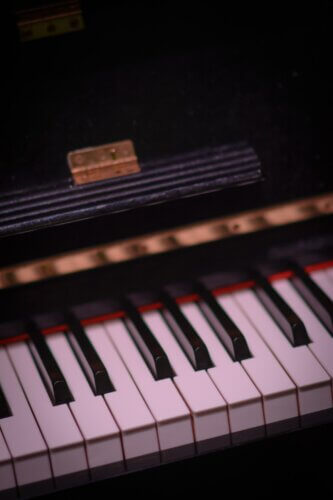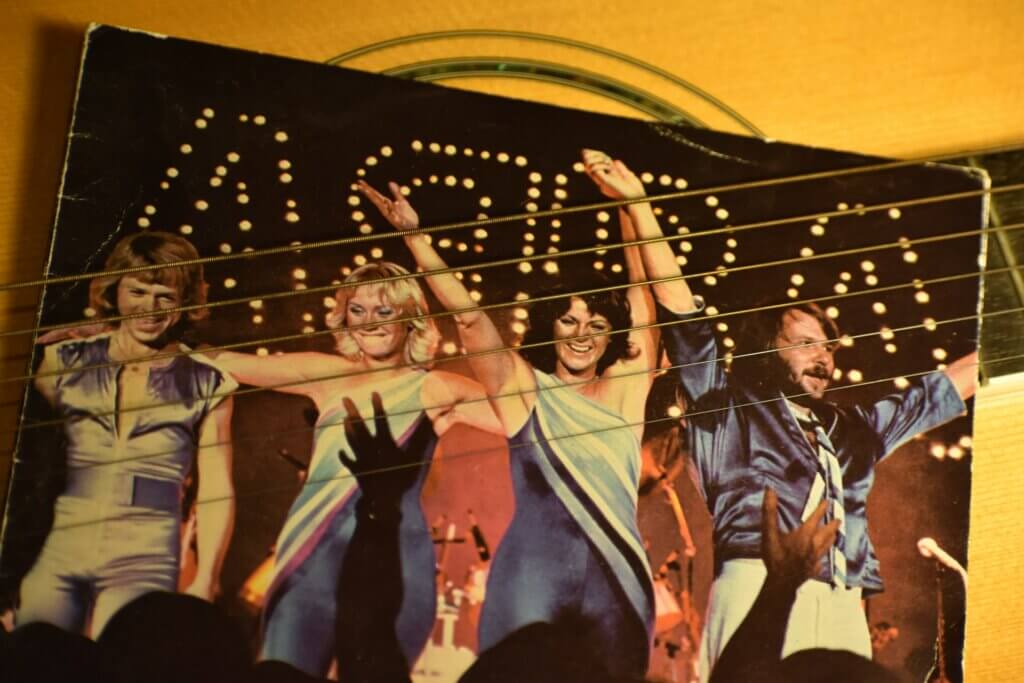What is the first thing most people think of when they hear the term “Swedish music”? ABBA, of course! The famous pop group from Stockholm was the first Scandinavian band to achieve international success in the 1970s. The two couples sold around 400 million records and are particularly famous for songs such as Mamma Mia, Dancing Queen and Waterloo. Musicals and even films followed. The band never officially broke up and new music was even released in 2021.
Who are ABBA?
Founded in Stockholm in 1972, ABBA consists of two former couples, Agnetha Ase Fältskog and Björn Kristian Ulvaeus as well as Göran Bror Benny Andersson and Anni-Frid “Frida” Synni Lyngstad. Although the group never actually disbanded, their music career as ABBA ended when the two couples split up in 1980-1982.
ABBA is a Swedish band that was particularly successful internationally in the 1970s. Founded in Stockholm in 1972, the group consisting of Agnetha Fältskog, Björn Ulvaeus, Benny Andersson and Anni-Frid Lyngstad sold over 400 million records worldwide. ABBA never officially split up. In 2021 four new songs and a new album were released. Further, the band organised a hologram world tour.
| Members | Agnetha Fältskog, Björn Ulvaeus, Benny Andersson and Anni-Frid Lyngstad |
|---|---|
| Foundation | 1972 in Stockholm |
| Active until | 1982 |
| Famous songs | Mamma Mia, Waterloo, Dancing Queen |
Agnetha Åse Fältskog
Agnetha Åse Fältskog was born on 5 April 1950 in Jönköping. She was already involved with music in an early age and performed on stage for the first time at the age of six. In addition to several small-scale performances, she played the piano and composed her own songs.
From 1967 to 1972, after working in a car dealership for some time, she worked as a solo artist and briefly in a dance band. In 1969, she met Björn Ulvaeus for the first time on a TV programme for which she had been engaged as a singer and they became a couple.
Together with Björn’s friend Benny Andersson and his fiancée, Anni-Frid Lyngstad, the four of them decided to work together musically, which resulted in ABBA.
After the separation from Björn and the end of ABBA, further solo albums were released. From 1989 onwards, she withdrew from the public eye and had to deal with personal losses and failed relationships. In 2004, after a long break, she released another album on which she covered songs from her youth. Eight years later, in 2012, she began working on a new album, which was released in 2013 under the title A.
Björn Kristian Ulvaeus
Born on 25 April 1945, Björn grew up in the southern Swedish town of Västervik and was already a member of a band in his youth, The Partners, who later changed their name to Hootenanny Singers.
In 1966, he dropped out of law school to concentrate on music and met Agnetha in 1969. In the second half of the 1960s, he worked with Benny Andersen, through whom, together with the partners of the two singers, the band ABBA began.
After the end of ABBA, Benny and Björn worked together on several musicals, including the musical Mamma Mia, which was performed for the first time in 1999.
Since 2020, Björn has been the president of the authors’ umbrella organisation CISAC, which campaigns for fair pay for composers and authors.
Göran Bror Benny Andersson
Benny Andersson was born in Stockholm in 1946 and received accordion lessons from his father and grandfather as a child.
He began playing the piano at the age of ten and taught himself a large part of his skills in this area.
He first performed with his father and grandfather as Benny’s Trio, then together with his girlfriend Christina Grönwall in the band Elverkets Spelmanslag and later as a keyboard player in the rock band Hep Stars.
From 1966 onwards he worked together with Björn, among others in the band ABBA. In 1968 he met Anni-Frid and worked as her producer. The two married in 1978.
After ABBA broke up, he worked with Björn on various musicals and founded the Benny Andersons’s Orkester BAO!. Further, he owns the record company Mono Music AB and lives in Stockholm with his wife, television presenter Mona Nörklit.
Anni-Frid “Frida” Synni Lyngstad
Anni-Frid Lyngstad, also known as Frida, was born on 15 November 1945 in Bjørkåsen, a town in the Norwegian municipality of Narvik. Her mother died of kidney failure when she was two years old and she did not meet her father, a German soldier who was stationed in Narvik during the Second World War, until 1977.
After the death of her mother, she came to Sweden with her grandmother. At the age of twelve, she sang in a band and began training as a dressmaker at 14. She entered into a first marriage with Ragnar Fredriksson, with whom she had two children.
In 1967, she made her first public appearance in a TV programme. After coming 4th in the Swedish competition for participation in the Eurovision Song Contest, she was signed by a record company and began her professional music career.
After her divorce, she met her future husband Benny on tour in 1968. After ABBA broke up, she continued to be active in the music business and worked with artists such as Phil Collins. However, after 1984, she only released a few albums and is now mainly active in charitable foundations. She even founded her own environmental protection organisation, Artister för miljö.
The history of ABBA: an overview
ABBA is not only one of the most successful bands in modern music history, but also the most successful Swedish band internationally with around 400 million records sold. But how did it come about? What about the setbacks and criticism in the mid-70s? And which songs helped the group achieve their breakthrough?

How did ABBA form?
The band ABBA was formed from the collaboration between Björn Ulvaeus and Benny Andersson. Their songs found their way into the Japanese charts, among others. As the two wanted to work together with their partners, who were also singers, the first song entitled People Need Love was recorded by the four of them in 1972, as the official ABBA website reports. However, it was not yet released under the name ABBA. As the song was successful, the four singers continued their collaboration.
The band name, which is made up of the first letters of the band members’ first names, was decided in 1973. This period also saw the creation of the song Waterloo, which was intended as an entry for the preliminary round of the Eurovision Song Contest.
ABBA at the Eurovision Song Contest 1974

Before the competition for the ESC preliminary round, or Grand Prix preliminary round as the ESC was still called at the time, Agnetha, Björn, Benny and Frida wavered between the songs Waterloo and Hasta Mañana, but ultimately decided in favour of Waterloo because the style of the song was so different from entries from previous years.
This turned out to be a good decision, as they took first place. The competition took place on 6 April 1974 in the British city of Brighton. However, the single for Waterloo had already been released on 4 March. After the Grand Prix victory, Waterloo reached the top of the charts in many of the 54 countries in which the single was released.
The first international successes of the Swedish cult band
ABBA celebrated international success following their performance at the ESC. The single for the song broke the Swedish sales record of its time, made it into the top 10 of the US charts and sold over 5 million copies. However, the subsequently released album for Waterloo was much less successful.
The subsequent singles Honey, Honey and So long were very successful in Sweden, but less popular internationally. This was reflected in the fact that some concerts on the European tour were cancelled due to low ticket sales.
Criticism of ABBA: “Too superficial”
After their first international successes, ABBA was criticised in the mid-70s. The Swedish press accused the group of having become too commercial and uncritical. Nevertheless, the group sold more than 450,000 copies of their next album entitled ABBA, breaking records once again. However, the band was not particularly successful abroad with this album either. Nevertheless, this did nothing to dampen the band’s international career.

Career highlight: ABBA in the international spotlight
At the time of the review, however, ABBA were still at the peak of their career. With the release of Mamma Mia and the Greatest Hits album, the breakthrough also followed abroad, especially in Australia, where the enthusiasm for the band was even given its own name: “Abbamania”. The television show The Best of ABBA was even more popular than the broadcast of the moon landing.
The period around 1976/1977 was characterised by numerous international concerts and TV appearances. 1976 saw the release of the song Dancing Queen, one of the most famous ABBA titles to this day, which was followed by a successful world tour that was even made into a film.
The last years of ABBA: marital crises, successes and the end of the band
In the years from 1978 to 1982, the first problems began to emerge. Due to the stress of work, Agnetha suffered pregnancy complications and a marital crisis with her husband Björn made working together more difficult. This culminated in their separation, whereupon Agnetha moved out with the children. However, the band continued to exist.
Nevertheless, ABBA continued to enjoy success in recent years, for example with the song Chiquitita, which was also recorded in Spanish and was particularly successful in South America. The album Super Trouper also dates from this period.
After Frida and Benny split up in 1981, ABBA continued to work together until the end of 1982. A break was announced for the band, but many see this as a de facto separation, as it ended the group’s performance until new songs were released in 2021 – nearly 40 years later.
From “Dancing Queen” to “Waterloo”: these ABBA songs were the most successful in Germany
| Song | Album | Year |
|---|---|---|
| Fernando | Greatest Hits! | 1976 |
| Honey, Honey | Waterloo | 1974 |
| SOS | ABBA | 1975 |
| Waterloo | Waterloo | 1974 |
| Super Trouper | Souper Trouper | 1980 |
| Knowing Me, Knowing You | Arrival | 1976 |
| Money, Money, Money | Arrival | 1976 |
| Dancing Queen | Arrival | 1976 |
| Chiquitita | Single/Voulez-Vous Deluxe Edition | 1979 |
| Mamma Mia | ABBA | 1975 |
How many albums has ABBA released?
ABBA released eight studio albums between 1973 and 1982. In addition, there were the two live albums ABBA Live and Abba Live at Wembley Arena as well as 14 compilations. From 1982 to 2020, a further 36 were added. There is also a series of singles of songs with Swedish, English, Spanish, German and French lyrics.
What do the members of ABBA do today?
Today, Björn and Benny in particular are still active in the entertainment industry. They continued to work together long after ABBA and were particularly successful in musical productions. Anni-Frid and Agnetha are both less active in the music industry and the public at large.
In 2006, Björn was honoured with the Hedinus Prize for his humanist commitment. He is also president of the copyright umbrella organisation CISAC, which campaigns for fair payment for composers and authors. He was elected to this position in 2020 for a term of three years. The 70-year-old lives in Stockholm with his wife Lena Källersjö, with whom he has two daughters.

Benny founded the BAO! (Benny Andersson’s Orkester) and owns the record company Mono Music AB. The 75-year-old now lives with his spouse Mona Nörklit in a suburb of Stockholm. He has a daughter with her.
Frida now lives in Switzerland and is involved in her own environmental foundation Artister för miljö (Artists for the Environment) and on her estate in southern Sweden. From 1992 to 1999 she was married to Heinrich Ruzzo Prince Reuß von Plauen.
Current: ABBA comeback with album Voyage
In 2018, ABBA announced the release of two new songs, as reported by Eurovision News, among others. A hologram tour was also to take place, on which holograms of the younger versions of the members from the 70s were to perform. However, this was initially postponed to 2020 due to technical problems.
At a live event broadcast online on 2 September 2021, the time had finally come – ABBA presented new music for the first time in 39 years. The two songs I Still Have Faith In You and Don’t Shut Me Down are the first two singles from the studio album Voyage, which was released on 5 November 2021. The album reached the top of the album charts and platinum status in many countries, including Germany, Sweden and the United Kingdom.

